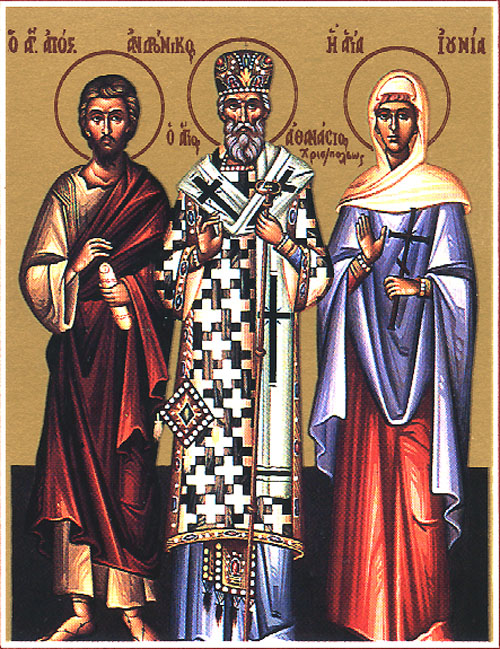|
|||
|---|---|---|---|
| This weekly bulletin insert complements the curriculum published by the Department of Christian Education of the Orthodox Church in America. This and many other Christian Education resources are available at http://dce.oca.org. | |||
|
The Church honors the Samaritan Woman who met Christ while drawing water at Jacob's Well. She was surprised by His love and concern for her, since she was a Samaritan, with whom the Jews "had no dealings." She was further surprised by His knowledge of her crowded personal life. But unlike some others, she was neither offended nor frightened by the depth of His insight, and so eventually she became His follower and strong witness. She is traditionally known by the name Photini. With her sons and sisters, she was arrested by the Emperor Nero and later suffered martyrdom, but not before she brought the cruel emperor's own daughter to the faith. Some years ago, Newsweek Magazine and other more notably academic publications trumpeted the news of a "remarkable discovery" concerning another of Christ's female followers. The discovery was made by a feminist professor of Christian Studies at Brandeis University. By reading older versions of the Bible, this professor had found out that the person mentioned by Saint Paul in Romans 16:7 is a woman named Junia, not a man named Junius. According to the Newsweek article, her name had been "masculinized" over the centuries by Biblical translators "with their own agenda"—presumably a misogynistic agenda. But Saint John Chrysostom, in the fourth century, wrote this about Junia: "Oh, how great is the devotion of this woman, that she should be counted worthy even to be called an apostle." The so-called discovery of Junia's identity as a female really reflects only incomplete knowledge and superficial research on the part of some modern scholars, not a brave uncovering of deliberately-hidden truth. Saint Paul writes about Junia with obvious admiration, calling her and her husband his "countrymen and fellow prisoners" and saying that they are "of note among the apostles." He also writes that they were both Christians before he was. One modern scholar who is reliable and respected, Ben Witherington, has speculated that Junia is the same person as Joanna, one of the Myrrh-Bearing Women. He believes it is possible that she broke with her first husband Chuza (King Herod's steward) and later married Andronicus. Then together they worked with Paul to spread the Gospel and teach. 
But whether Junia is Joanna or a different person really makes little difference. She is honored as someone who, like the Samaritan Woman, believed in Jesus Christ deeply enough to be imprisoned for her faith. She is recognized as His apostle. The Orthodox Church has never hidden or attempted to alter facts about Junia. As we have noted, Saint John Chrysostom singles her out for praise. And the reason she comes to our attention in the first place is that Saint Paul does the same. He appreciated any person, woman or man, who shared his dedication and readiness to suffer for Christ. Junia is a shining example of just such a person. |
|||
